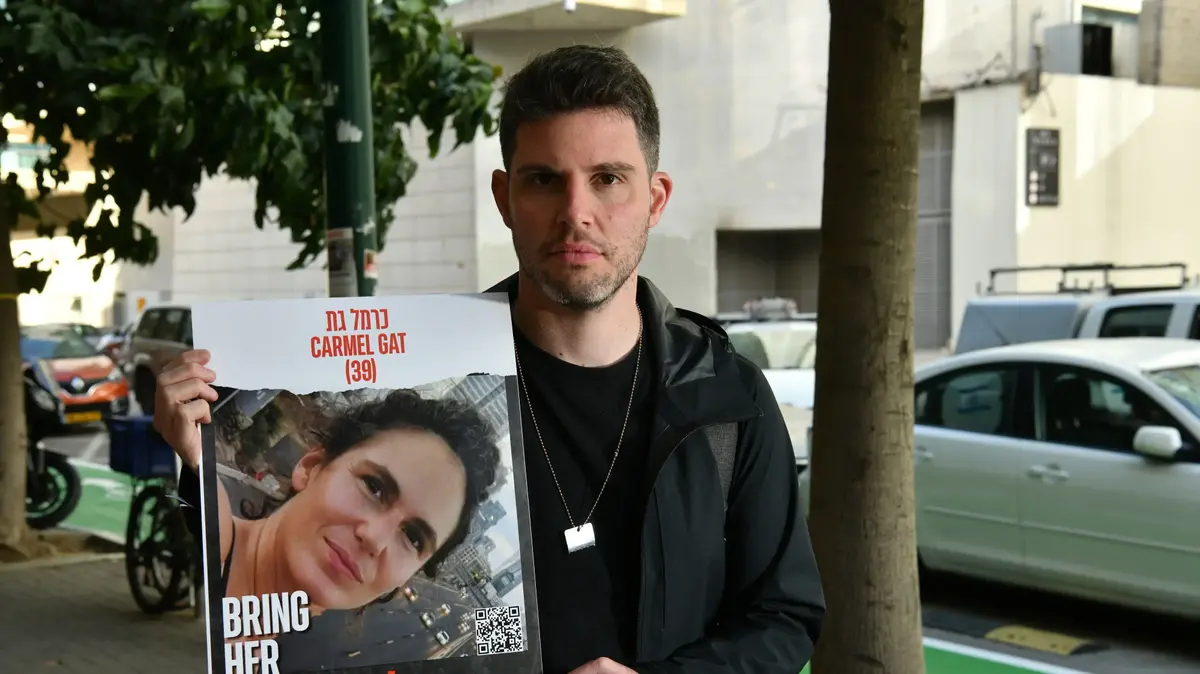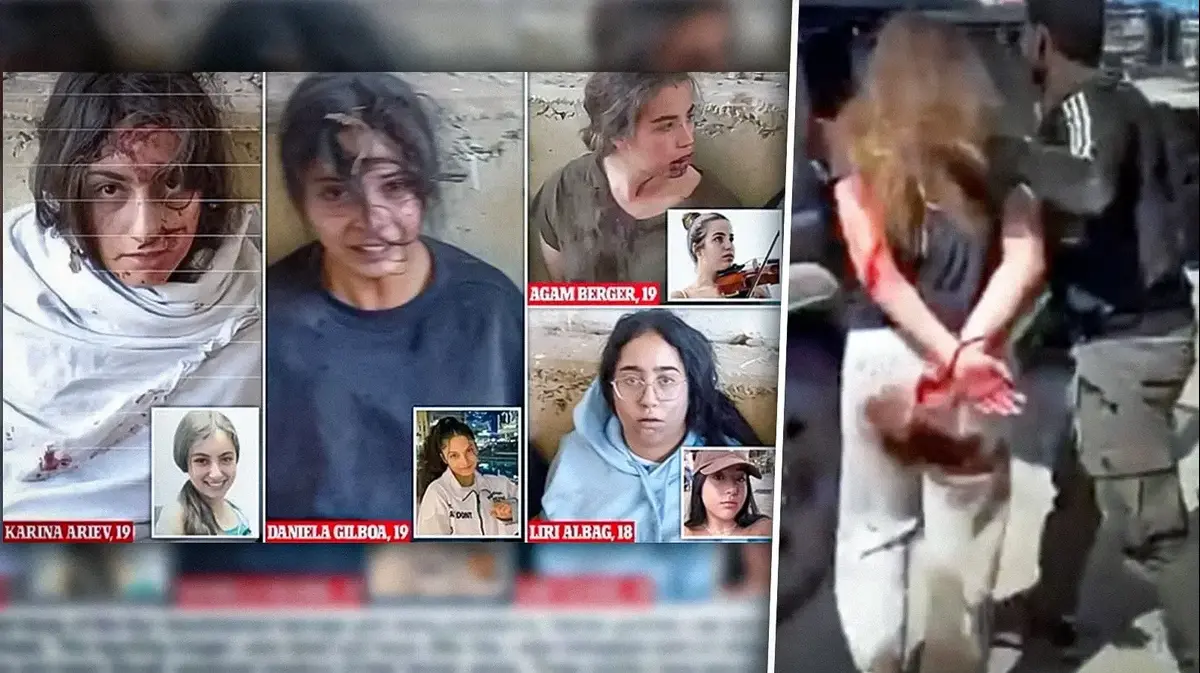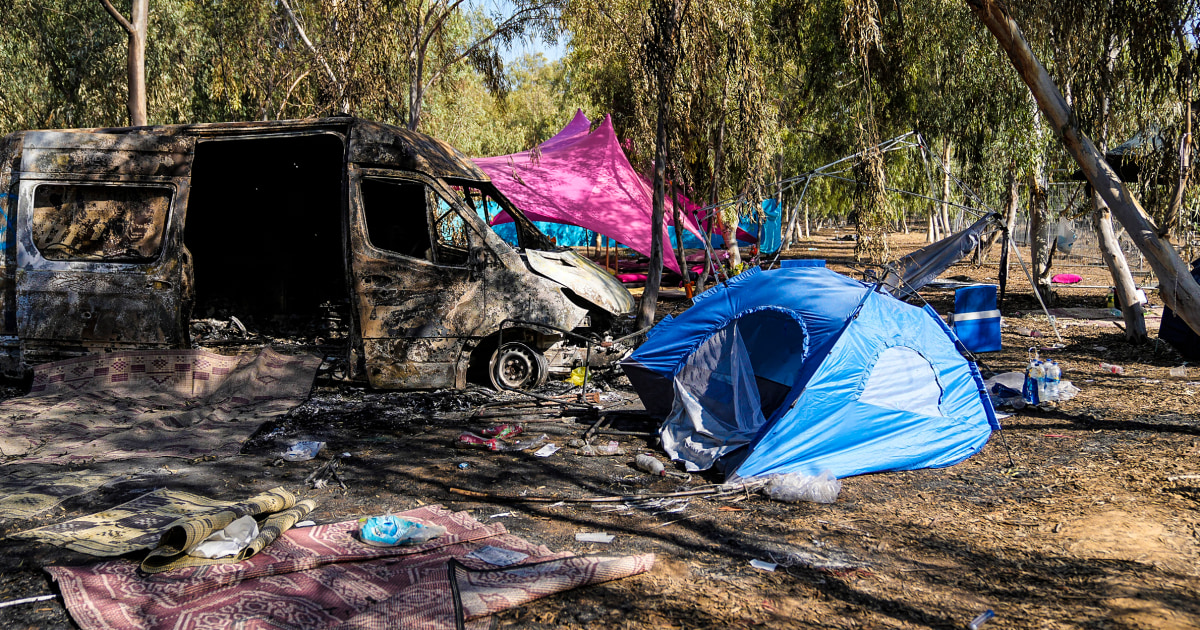Enlarge image
Demonstrators, many of them from Ukraine, protest in Berlin after the atrocities of Russian soldiers in Bucha became known
Photo: Sean Gallup/Getty Images
On a country road about 20 kilometers outside of the Ukrainian capital Kyiv, the bodies of several women and a man lie next to car tires under a brown blanket.
They are naked, their bodies partially burned.
Photographer Mikhail Palinchak documented the scene after the Russian soldiers withdrew from the areas around Kyiv.
New, brutal acts of violence against the Ukrainian civilian population are being uncovered almost every day, and reports of rape are increasing.
The NGO Human Rights Watch warned on April 3 that Russia was using sexual violence as a weapon in the war against Ukraine.
Ukrainian Human Rights Commissioner Lyudmyla Denisova told the BBC, among other things, about a basement in Bucha where 25 girls and women between the ages of 14 and 25 were held and raped by groups of Russian soldiers.
Nine of them are now pregnant.
Bodies of children were found naked and with their hands tied behind their backs;
they had apparently been raped beforehand, according to a report in Time Magazine.
On Tuesday, Ukrainian and UN officials said boys and adult men were among the alleged victims.
The cases known so far are only “the tip of the iceberg”.
SPIEGEL:
Ms. Hutchinson, you have been working on the issue of rape in wars for 20 years, most recently for NATO as the agency responsible for women, peace and security.
Has the level of sexual violence in Ukraine surprised you?
Hutchinson:
It breaks my heart because none of this is new.
Sexual violence in conflict has always been an element of war, and we as an international community still don't take it seriously enough.
We also thought we had overcome that in Europe - the rape camps in the Yugoslav war shocked us.
Now it's happening again here, on European soil, and we're shocked.
But shock is not an answer.
We have to take action.
SPIEGEL:
Why do soldiers rape in war?
Hutchinson:
The function of sexual violence in war is the destruction not only of the victim but also of the family, society and nation.
It aims to destroy the community over these bodies.
We know of cases in Ukraine where women have been raped in front of their families.
The lasting consequences for the victim and family are devastating.
That's why it's such a heinous crime.
The trauma of rape isn't always as obvious as a physical wound.
But when women have been raped, it can also happen that they are shunned by their communities, even families.
The effects stay forever.
SPIEGEL:
We know that many inexperienced conscripts are deployed on the Russian side and that they also plunder.
Doesn't that just come down to opportunity?
Hutchinson:
Rape in wartime can be done out of opportunism or as a rite to strengthen the unity of soldiers.
In some African conflicts, it also happened that the soldiers were not paid, but instead were apparently allowed to rape.
Are the Russian soldiers opportunistic?
Do they rape and kill because the war isn't going as planned for them, out of anger and frustration?
Yes, definitely too.
MIRROR:
But?
Hutchinson:
But we shouldn't fall into the trap of saying: that's what happens, these are men, this is war.
It gets raped in every war, yes.
But not in the continuous way that seems to be happening in Ukraine now.
This isn't about a bunch of soldiers getting violent because they didn't have sex.
It's about the heinous destruction of something, of someone.
SPIEGEL:
We know from other wars, such as the one in Ethiopia, that sexual violence was apparently planned properly.
Allegedly, HIV-infected soldiers from Eritrea were sent to infect women in Tigray.
By comparison, sexual violence in Ukraine appears less systematic.
Hutchinson:
Certainly the lack of discipline and professionalism of the Russian armed forces can play a role.
We will probably never find an order that was written down.
But if commanders don't stop the raping, then it's certainly a strategy.
The Russian leadership bears the responsibility.
If the commanders didn't signal that this behavior will not be tolerated, they make it clear that rape is an element of this war, that it is accepted as part of scorched earth tactics.
SPIEGEL:
Russian President Vladimir Putin - who rejects the war crimes of his soldiers - has just honored a battalion that allegedly committed atrocities in the Kiev suburb of Bucha.
Hutchinson:
This is precisely the evidence that will also be relevant for criminal investigations.
If the chain of command rewards action, then violence against civilians, sexual violence, is a weapon, and a sustained and long-term one at that.
And I am convinced that the conclusion that will be reached is that sexual violence in this war is part of a strategy aimed at instilling fear and terror in civilian populations and disintegrating society.
SPIEGEL:
Before the attack in February
Putin mocked Ukraine with a rape allusion, the quote comes from a Soviet-era punk song: »My beauty, whether you like it or not, it is your duty.« Foreign Minister Sergei Lavrov recently referred to Ukraine as a womb that » can still give birth to a reptile «.
Does this sexualized and misogynistic language encourage soldiers to commit acts of violence?
Hutchinson:
When the nation is talked about as a woman, a dirty woman, a woman out of control, a woman spreading her legs for the West -- that kind of rhetoric -- then a narrative is built into which rape is embedded as a control mechanism, as an exercise of power.
SPIEGEL:
Rape was first classified as a war crime in 1919.
However, the first trial was not conducted until 1998 against a Rwandan politician.
The United Nations first prosecuted such crimes under the UN war crimes tribunal on the former Yugoslavia.
How to ensure that war criminals are brought to justice?
Hutchinson:
The United Nations has already sent its teams of specialists to Ukraine to gather evidence.
They conduct interviews with the survivors.
The problem is that it often takes years before perpetrators are brought to justice, that survivors have to wait a long time for justice.
We as an international community must ensure that sexual violence is not forgotten and swept under the rug.
These traumas are passed on through generations.
SPIEGEL:
You personally have spent years developing strategies for women, peace and security for both the UN and NATO.
But this is of no use to the women in Ukraine.
Hutchinson:
It's frustrating for me.
We have passed resolution after resolution which, among other things, enshrines the protection of women – and men too, by the way – from sexual violence in conflicts and the obligation to protect civilians.
These resolutions are binding.
But we still see rape in war.
We may have to consider how we should reform the UN and redesign the entire world order to better protect people.
This contribution is part of the Global Society project
Expand areaWhat is the Global Society project?
Under the title »Global Society«, reporters from
Asia, Africa, Latin America and Europe
report on injustices in a globalized world, socio-political challenges and sustainable development.
The reports, analyses, photo series, videos and podcasts appear in a separate section in SPIEGEL's international section.
The project is long-term and is supported by the Bill & Melinda Gates Foundation (BMGF).
A detailed FAQ with questions and answers about the project can be found here.
AreaWhat does the funding look like in concrete terms?open
The Bill & Melinda Gates Foundation (BMGF) has been supporting the project since 2019 for an initial period of three years with a total of around 2.3 million euros - around 760,000 euros per year.
In 2021, the project was extended by almost three and a half years until spring 2025 under the same conditions.
AreaIs the journalistic content independent of the foundation?open
Yes.
The editorial content is created without the influence of the Gates Foundation.
AreaDo other media also have similar projects?open
Yes.
With the support of the Gates Foundation, major European media outlets such as The Guardian and El País have set up similar sections on their news sites with Global Development and Planeta Futuro respectively.
Did SPIEGEL already have similar projects? open
In recent years, SPIEGEL has already implemented two projects with the European Journalism Center (EJC) and the support of the Bill & Melinda Gates Foundation: the "OverMorgen Expedition" on global sustainability goals and the journalistic refugee project "The New Arrivals ", within the framework of which several award-winning multimedia reports on the topics of migration and flight have been created.
Expand areaWhere can I find all publications on the Global Society?
The pieces can be found at SPIEGEL on the Global Society topic page.





/cloudfront-eu-central-1.images.arcpublishing.com/prisa/OJSQ7GWB5BC4XBQDMMJFYJF5BU.jpg)









